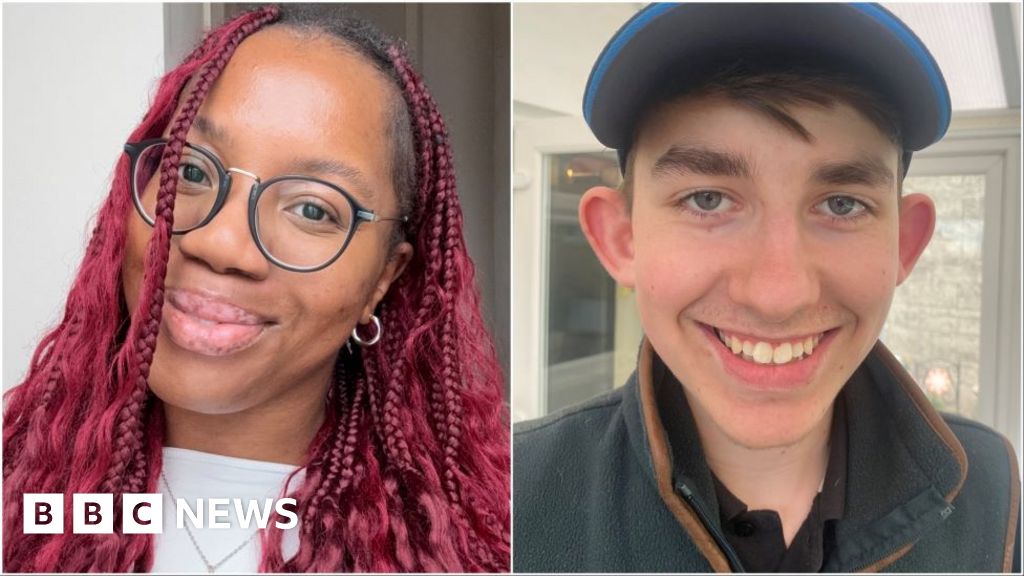A sister and brother share how their child rights activism led them to help their hometown become the first UNICEF Child Friendly City in the U.S.
A passion for child rights advocacy led siblings Jennifer, a UNICEF USA National Youth Council member, and Michael, a UNICEF USA Youth Representative, to help Houston become the first UNICEF Child Friendly City in the U.S.
© Jennifer and Michael
Jennifer, 20, a rising junior at Stanford University, and her brother, Michael, a 27-year-old senior at a Houston high school, are just like any other siblings in many ways. They are best friends, and even though Michael is three years younger, he’s always mistaken for the older sibling due to his height — a fact that has become a running joke between the two. But one thing sets them apart from other siblings their age: their unwavering passion for child rights and the lengths they have gone to in order to make their community a better, safer and more just place for children.
Here, they detail how they decided to become youth advocates and help pave the way for their city to become the first UNICEF Child Friendly City in the U.S.
Jennifer’s story
Growing up, my younger brother, Michael, and I would sit next to my great-grandmother during summers, captivated by the heartbreaking stories of her childhood as an orphan and refugee fleeing the Armenian genocide. As she sat before us in her black rocking chair, the painful accounts of her escape from conflict and harm and facing food insecurity and poverty would stay with us and reverberate in our lives.
She was our reality that peeled back the curtain that shielded us from the tragedy facing children worldwide, and she cultivated a passion within us to advocate for the protection of all children. The image of her, a brave child who survived against all odds, was our reminder to be fearless and unrelenting, and take bold action for the sake of others. As a child, she had no voice, so I made it my mission to be the voice for vulnerable children.
“As a child [fleeing the Armenian genocide, my great-grandmother] had no voice, so I made it my mission to be the voice for vulnerable children.”
As a result, when I saw disparities in opportunity and childhood outcomes taking hold in Houston, I decided to advocate in my school district for mental health and education equity. This experience made me realize that despite best intentions, there needed to be more youth voices in spaces dedicated to serving youth. It felt as though people were driving in cars, all attempting to get to the destination of improving youth outcomes. Yet, children had seemingly been left behind as passengers in every vehicle.
This reality was disheartening but it only made me more determined to ensure that youth were empowered to become the drivers of our own vehicles of change in my community.
During the early days of the COVID-19 pandemic, I authored a survey, alongside my younger brother and other Houston area youth, in an attempt to gauge the opinions of parents, students and teachers regarding school reopening plans for the Fall of 2020 and identify areas of need for families and children, ranging from technological supports to food access. The survey went viral, and its national coverage ultimately influenced Houston area school districts’ reopening plans. It also sparked several initiatives that helped Houston families and led to meaningful discussion surrounding the disproportionate effects the COVID-19 pandemic was producing on low-income minority children.
Seeing the positive change resulting from our youth organizing efforts demonstrated to me the power youth hold to do good and be changemakers in our communities when we unite behind a cause.
UNICEF CFCI Youth Council members including Jennifer, at left in UNICEF blue dress, joined Mayor Sylvester Turner at an event celebrating Houston’s designation as a CFCI candidate city on Aug. 11, 2022.
© UNICEF USA
Yet this ability to organize with fellow youth and advocate for issues we care about was under threat in the U.S. At the time, the historic B.L. v. Mahanoy Area School District student free speech case was ongoing, calling into question the constitutionality of schools moderating students’ off-campus speech. In February 2021, my brother and I collaborated with fellow youth from Houston and around the country to author an amicus curiae brief to the U.S. Supreme Court to protect student free speech.
Although the Supreme Court ruled in favor of student free speech, it reminded me that the fundamental human rights we deem inalienable can be challenged and taken away from children and youth, even in the U.S. Recognizing how vulnerable and prone to exploitation children are made me determined to protect children and improve children’s well-being at home and abroad — a desire that was only strengthened after I learned that the U.S. is the only United Nations member state that has yet to ratify the U.N. Convention on the Rights of the Child.
“Recognizing how vulnerable and prone to exploitation children are made me determined to protect children and improve children’s well-being at home and abroad — a desire that was only strengthened after I learned that the U.S. is the only United Nations member state that has yet to ratify the U.N. Convention on the Rights of the Child.”
The summer before my freshman year of college, I discovered Houston was working toward becoming the first UNICEF Child Friendly City in the U.S., joining more than 3,000 municipalities around the world. I began collaborating with Houston municipal leadership to conduct situational analyses, identify priority issue areas in the city affecting youth, and help draft Houston’s Child Friendly Cities Initiative (CFCI) Action Plan.
By the summer of 2022, we had identified inequitable access to services, lack of emergency preparedness, and an absence of children’s participation as Houston’s three CFCI key priority issues. I was charged with spearheading the implementation of the youth engagement priority within Houston’s CFCI Action Plan, and worked tirelessly to engage youth from all over Houston. I facilitated discussions with youth and moderated youth advocacy trainings, visited and connected with communities and worked with leadership in Houston area high schools to recruit a diverse cohort of Houston CFCI Youth Leaders. I also worked directly with youth to implement youth-led initiatives.
In the process, I became a part of an intergenerational community in Houston of adult and youth leaders working towards the common goal of improving children’s well-being. We had not only built a vehicle of change but also made young people the drivers of that change. Our efforts ultimately culminated in Houston effectively becoming the first UNICEF Child Friendly City in the U.S. as of August 2023, setting a precedent for recognizing children’s rights in the U.S.
Being a part of this group of youth and adult leaders relentlessly standing up for children in Houston has been one of the most fulfilling experiences. I am reminded every day of the dedication, determination and drive required from those who embark on the advocacy journey for children. To me, CFCI symbolizes the opportunity for all children to thrive, grow and succeed wherever they are in the world. It means engaging with them, valuing their voices, ensuring their safety and health, and respecting them as human beings, not as subjects that “earn” their rights with age. Above all, CFCI means building a better future for children with children. Something I know my great-grandmother would be proud of.
At an event celebrating Houston’s designation as a UNICEF Child Friendly City candidate on August 11th, 2022, UNICEF USA President & CEO Michael J. Nyenhuis, left, met youth who participated in the development of Houston’s CFCI Local Action Plan, including Jennifer, right.
© UNICEF USA
Michael’s story
I first became involved with CFCI in the summer of 2022 as part of the Children’s Outdoor Bill of Rights Committee (COBOR) in Houston. I did so because I believe that children are the future and we need to invest in children’s well-being and development to make sure that we have equitable access to city resources to prosper and grow.
As members of the COBOR intergenerational committee of environmental leaders and youth, we discussed the most critical needs for children’s well-being. Then, we came up with 12 rights that represent equitable nature accessibility, including safe routes, access to shade and green spaces. Afterward, I joined the campaign to obtain 2,000 pledge signatures, which led the Mayor of Houston to formally recognize the COBOR through a mayoral proclamation in April 2023. With the city’s commitment, we hope to connect children to safe outdoor experiences and activities that will improve the welfare of all children in Houston.
“With the city’s commitment, we hope to connect children to safe outdoor experiences and activities that will improve the welfare of all children in Houston.”
My involvement in COBOR naturally led me to CFCI. I joined the CFCI Youth Council in October 2022. We come together to share our ideas and are given a voice on decisions that directly affect youth. One issue that I am very passionate about on the city level is emergency preparedness. Living in Houston, weather-related issues, such as flooding and tropical storms, are common. After having experienced Hurricane Harvey and Winter Storm Uri, I realized the importance of emergency preparedness in one’s mental and physical well-being.
So, I became involved in the Emergency Preparedness Committee in CFCI to educate youth and increase communications and resources ahead of emergencies, knowing that this information can make the difference between life and death. We created infographics to distribute to schools and on social media outlets, launching our campaign on social media this summer. Powered with this information, I hope that youth will grow to become more aware adults.
“Houston is in one of the most disaster-prone regions of the country; as a result, many children growing up here have been subjected to devastation and hopelessness.”
Houston is in one of the most disaster-prone regions of the country; as a result, many children growing up here have been subjected to devastation and hopelessness. This is particularly true for low-income children, who lack access to emergency preparedness resources and are most often affected by the long-term consequences of disasters. As our work continues, I hope to begin an initiative to develop new preparedness resources, including informational videos for children K-5 (in both English and Spanish)that can be used by school districts in the Houston area and, with the help of nonprofits and governmental resources, to increase the availability of emergency kits ahead of disasters, including non-perishable food, water, first aid supplies, flashlights and batteries.
Through my involvement as a youth advocate, I have learned that youth can be changemakers in our communities, and we are not too young to be involved. Our unique perspectives are vital to the discussion table and youth participation ensures that our needs are considered in city planning and, ultimately, policymaking.
It is an exciting time for youth in Houston. As the first UNICEF Child Friendly City in the U.S., Houston has a huge role to fulfill as a model for other cities across the country. I want to be a part of this continuing mission to protect the rights of children and ensure our needs and voices are included in decision-making and public policies. I believe the work that CFCI does is crucial in providing safe living environments and equitable social services for children to thrive and grow into healthy adults. Being part of a passionate group of young people in CFCI inspires and motivates me because I believe when we come together, we can accomplish any goal we set.
Every child and young person has the right to health, education, protection and participation. CFCI cities can make these rights a reality. Urge your mayor or municipal office to keep children top of mind in every policy and funding decision while engaging children and youth along the way.
Credit: Source link










